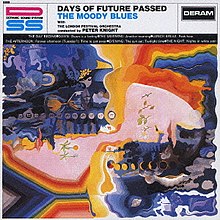
Back Days of Future Passed Czech Days of Future Passed German Days of Future Passed Esperanto Days of Future Passed Spanish روزهای آینده گذشت Persian Days of Future Passed French Days of Future Passed Galician Days of Future Passed HE Days of Future Passed Italian デイズ・オヴ・フューチャー・パスト Japanese
This article contains too many or overly lengthy quotations. (April 2024) |
| Days of Future Passed | ||||
|---|---|---|---|---|
 | ||||
| Studio album by | ||||
| Released | 17 November 1967[1][2] | |||
| Recorded | 9 May – 3 November 1967 | |||
| Studio | Decca, London | |||
| Genre | ||||
| Length | 41:34 | |||
| Label | Deram | |||
| Producer |
| |||
| The Moody Blues chronology | ||||
| ||||
| Singles from Days of Future Passed | ||||
| ||||
Days of Future Passed is the second studio album by English progressive rock band the Moody Blues, released on 17 November 1967, by Deram Records.[8] It has been cited by Rock and Roll Hall of Fame and others as one of the earliest albums of the progressive rock genre and one of rock music's first concept albums.[9][10]
The album represents a significant creative turning point for the band. The album is their first with guitarist and singer Justin Hayward in place of Denny Laine and bassist John Lodge in place of Clint Warwick. The album is also their first to feature longtime producer and collaborator Tony Clarke and the first to feature keyboardist Mike Pinder on Mellotron. These changes, combined with a shift away from R&B covers toward original compositions and a thematic concept, helped define the band's sound for the next several albums and earned the group new critical and commercial success.
The album was recorded to showcase the stereo recording techniques of Decca Records' new imprint, Deram. The label had requested the group record covers of pop and classical music along with an orchestra. Instead, the album features original compositions expressing the day in a life of an everyday person, interspersed with orchestral interludes arranged and conducted by Peter Knight and performed by the London Festival Orchestra.
The album was a moderate success upon release, but steady FM radio airplay and the success of hit single "Nights in White Satin", caused the album to become a top ten US hit by 1972. It has since been listed among the most important albums of 1967 by Rolling Stone.
- ^ "Reaching for riches again". Birmingham Evening Mail. 8 November 1967. p. 3. Retrieved 15 November 2024 – via Newspapers.com.
- ^ "'Nights in white satin' tipped the top". Widnes Weekly News. 10 November 1967. p. 22. Retrieved 15 November 2024 – via Newspapers.com.
- ^ Cite error: The named reference
sswas invoked but never defined (see the help page). - ^ Will Romano (1 September 2010). Mountains Come Out of the Sky: The Illustrated History of Prog Rock. Backbeat Books. p. 34. ISBN 978-1-61713-375-6.
- ^ James E. Perone (2012). The Album: A Guide to Pop Music's Most Provocative, Influential, and Important Creations. ABC-CLIO. p. 117. ISBN 978-0-313-37906-2.
- ^ Cite error: The named reference
allmusicwas invoked but never defined (see the help page). - ^ Connolly, Ray (4 November 1967). "Ray Connolly on Discs". Evening Standard. p. 7. Retrieved 15 November 2024 – via Newspapers.com.
- ^ Cite error: The named reference
RS67was invoked but never defined (see the help page). - ^ Progressive Rock Spotlight. Rock & Roll Hall of Fame. Www.rockhall.com. https://www.rockhall.com/progressive-rock-spotlight.
- ^ Prince, Patrick (18 August 2010). "Moody Blues 'Days of Future Passed' doesn't get its due". Goldmine Magazine: Record Collector & Music Memorabilia. Retrieved 29 April 2024.